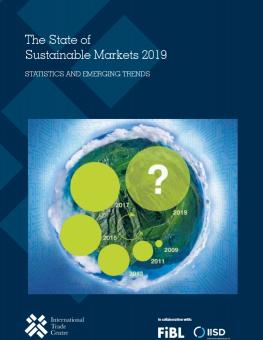
The State of Sustainable Markets 2019: Statistics and emerging trends
This joint publication by ITC, IISD and FiBL provides comprehensive data on the sustainability standards being used for the production of various commodities, including banana, cocoa, coffee, cotton, oil palm, soybean, sugarcane, tea and forestry products.
This joint publication from the International Trade Centre (ITC), International Institute for Sustainable Development and the Research Institute of Organic Agriculture (FiBL) provides comprehensive data and analysis involving the sustainability standards being used across several commodities.
More specifically, the standards considered here are used in the banana, cocoa, coffee, cotton, oil palm, soybean, sugarcane, tea and forestry sectors. The report consolidates data provided by 14 standards organizations, which are also accessible in an interactive format on the ITC website. This is the fourth year of the State of Sustainable Markets report, with this edition also providing statistics on indicators such as land area used to grow standard-compliant crops, production volume and much more.
You might also be interested in
Agreement on Climate Change, Trade and Sustainability: A landmark pact for trade and sustainability
The ACCTS pact, signed by Costa Rica, Iceland, New Zealand, and Switzerland, aligns trade and environmental policies, tackling fossil fuel subsidies, eco-labels, and green trade.
Addressing Carbon Leakage: A toolkit
As countries adopt ambitious climate policies, this toolkit examines strategies to prevent carbon leakage—when production and emissions shift to nations with weaker climate policies—and explores the trade-offs of each approach.
IISD Trade and Sustainability Review, December 2024
This edition of the IISD Trade and Sustainability Review presents four expert perspectives on how agricultural support and subsidies can promote sustainability in developing and least developed countries.
The Responsible Agricultural Investment Tool for Agribusiness and Case Studies
This report summarizes a collaboration to support agribusinesses in complying with principles of responsible investment in agriculture and food systems.